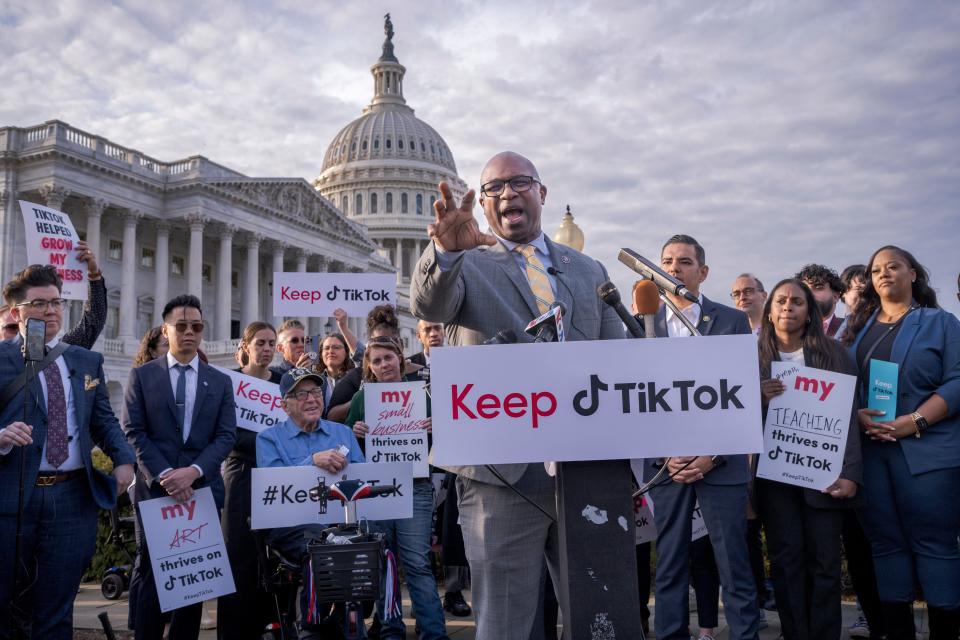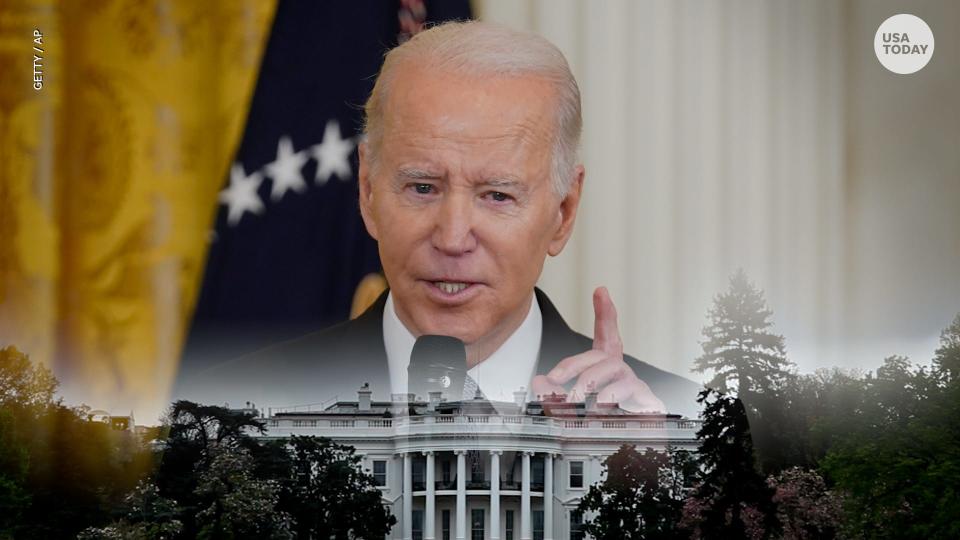This week in politics: DeSantis stands up to Trump; Fed raies rates; TikTok is becoming a free-speech issue
- Oops!Something went wrong.Please try again later.
- Oops!Something went wrong.Please try again later.
Gov. Ron DeSantis is finally standing up to Donald Trump's bullying after months of trying to ignore the former president's jeers.
This signals a more aggressive turn by Florida's governor, who hasn't entered the 2024 contest but remains Trump's chief rival for the Republican presidential nomination.
Stay in the conversation on politics: Sign up for the OnPolitics newsletter
Skepticism loomed on Capitol Hill as the Federal Reserve continued its interest rate hike to combat inflation amid the Silicon Valley Bank debacle.
The country is still asking questions after SVB suffered $1.8 billion in after-tax losses, and there is a bipartisan crackdown coming on the Fed for its failure to foresee the problem.
TikTok remained a hot topic, as its CEO was grilled by lawmakers this week. But the foreign-owned app saw supporters, who cast it as a free-speech issue, stand against a potential ban.
President Joe Biden stood up to congressional Republicans with arguably his mightiest weapon: the veto pen.
And the Supreme Court caught the nation's attention, but this time for an unanimous decision that untangles a legal knot for disabled Americans.
What happened this week in politics?
The Federal Reserve continued with its aggressive effort to tame inflation amid Silicon Valley Bank’s collapse
Gov. Ron DeSantis isn't ignoring former President Donald Trump's attacks any longer
The White House and Congress's combined scrutiny of the Chinese-owned app TikTok is meeting pushback from one of the most outspoken liberal lawmakers
President Biden levied his first veto and it dives directly into one of the GOP's favorite cultural wars.
The Supreme Court is getting attention after the justices sided unanimously with a deaf student
Fed raises rates amid SVB failure
Many had wondered if the Federal Reserve would blink on raising interest rates given the breakdown of Silicon Valley Bank.
But ultimately the agency hiked it up by a quarter percentage point which brings federal funds rate to a range of 4.75% to 5%.

Fed Chair Jerome Powell said at a news conference they had to show how serious they are about knocking down inflation, which reached a 40-year high of 9.1% last June.
Economy: Fed hikes interest rate 0.25 point to curb inflation despite banking turmoil
"It is important that we sustain that confidence with our actions as well as our words," he said.
But Powell remains in the doghouse with Democratic Sen. Elizabeth Warren, of Massachusetts, who has introduced bipartisan legislation with Republican Sen. Rick Scott, of Florida, to create a new Fed oversight position.
"The Fed under Chair Powell made a mistake not pausing its extreme interest rate hikes," Warren said via Twitter this week.
"I've warned for months that the Fed's current path risks throwing millions of Americans out of work," she added. "We have many tools to fight inflation without pushing the economy off a cliff."
The Fed under Chair Powell made a mistake not pausing its extreme interest rate hikes. I've warned for months that the Fed's current path risks throwing millions of Americans out of work. We have many tools to fight inflation without pushing the economy off a cliff.
— Elizabeth Warren (@SenWarren) March 22, 2023
DeSantis finally strikes back at Trump
Florida Gov. Ron DeSantis has ignored former President Donald Trump's taunts for months, but he clapped back in an interview with British media personality Piers Morgan.
Trump regularly uses his social media platform to tab the Florida governor, considered his top rival in 2024, with names such as “Ron DeSanctimonious” and ''Meatball Ron."

But as long as people call DeSantis a "winner," he doesn't mind.
Politics: DeSantis position on Ukraine different from presidential hopefuls in GOP
More: Despite Trump's calls for protests, few efforts emerge, as supporters worry: 'It's a trap'
"It’s not important for me to be fighting with people on social media," he said. "It’s not accomplishing anything for the people I represent."
Bowman: Keep TikTok
TikTok CEO Shou Zi Chew testifying before Congress was one of the big Capitol Hill highlights this week.
There is a bipartisan effort to curtail or ban the popular social media app due to national security concerns, but lawmakers who are polar opposites are speaking against such plans.
Rep. Jamaal Bowman, an avid TikTok user and outspoken progressive in Congress, cast a ban as going against the country's free-speech values.

The New York Democrat told USA TODAY the app represents a place, "where people can express themselves" the way they want.
Tech: Is TikTok getting banned? CEO in for 'tough fight' defending Chinese ownership on Capitol Hill
More: TikTok CEO grilled on Capitol Hill
"Banning it is an attack on the people who prefer this platform's freedom of speech," he said.
Similarly Sen. Rand Paul, R-Ky., opposes prohibiting TikTok, arguing it aligns with China's Communist Party.
"TikTok is actually banned in China," Paul, a libertarian-leaning senator, said. "We will be acting like the Chinese government if we ban TikTok here."
We were on the ground yesterday at @RepBowman’s press conference calling on his peers in Congress to stop the attempted bans on TikTok.
The government shouldn't be able to tell us what social media apps we can and can't use. We have a right to free speech. pic.twitter.com/W5UKqtbMf3— ACLU (@ACLU) March 23, 2023
Biden's first veto tied to ESG
President Joe Biden used his veto pen for the first time this week over a new rule about retirement plans.
Congress voted to block a Labor Department policy allowing those plans to weigh the environmental, social and governance, or ESG for short, on investments.

For months Republicans have attacked the rule as a "woke" provision more concerned with an ideological agenda than retirees' pockets.
Money: GOP vs. ESG. Why Republicans are fighting 'woke' ESG investing
The measure was able to get through the Democratic-led Senate thanks to Sens. Jon Tester, D-Mont., and Joe Manchin, D-W.Va., who are two of the most endangered incumbents in 2024.
By the way, Trump vetoed 10 bills during his time in office while former President Barack Obama vetoed 12 bills.
House Republicans tried to overturned Biden's veto in a vote Thursday, but fell well short of the needed two-thirds majority.
Supreme Court sides with deaf student
The Supreme Court usually makes headlines for its divisive cases, but a 9-0 decision grabbed America's attention this week.
It's the case of Miguel Perez, who is deaf and sued his Michigan school for damages over profound lapses in his education. He claimed, for example, school aides assigned to him did not know sign language.

More: Special education clash. Supreme Court sides unanimously for student with disability
The core question was whether a person can sue for damages under the Americans with Disabilities Act if they are already seeking relief under the Individuals with Disabilities Education Act.
All nine justices agreed that Perez didn't need to exhaust the requirements of the IDEA process before filing a lawsuit for damages under the ADA.
Legal experts told USA TODAY untangling this federal legal knot could give parents with disable children more leverage when they negotiate for their education.
This article originally appeared on USA TODAY: Trump vs. DeSantis heats up; Ukraine divides GOP; U.S. may ban TikTok

